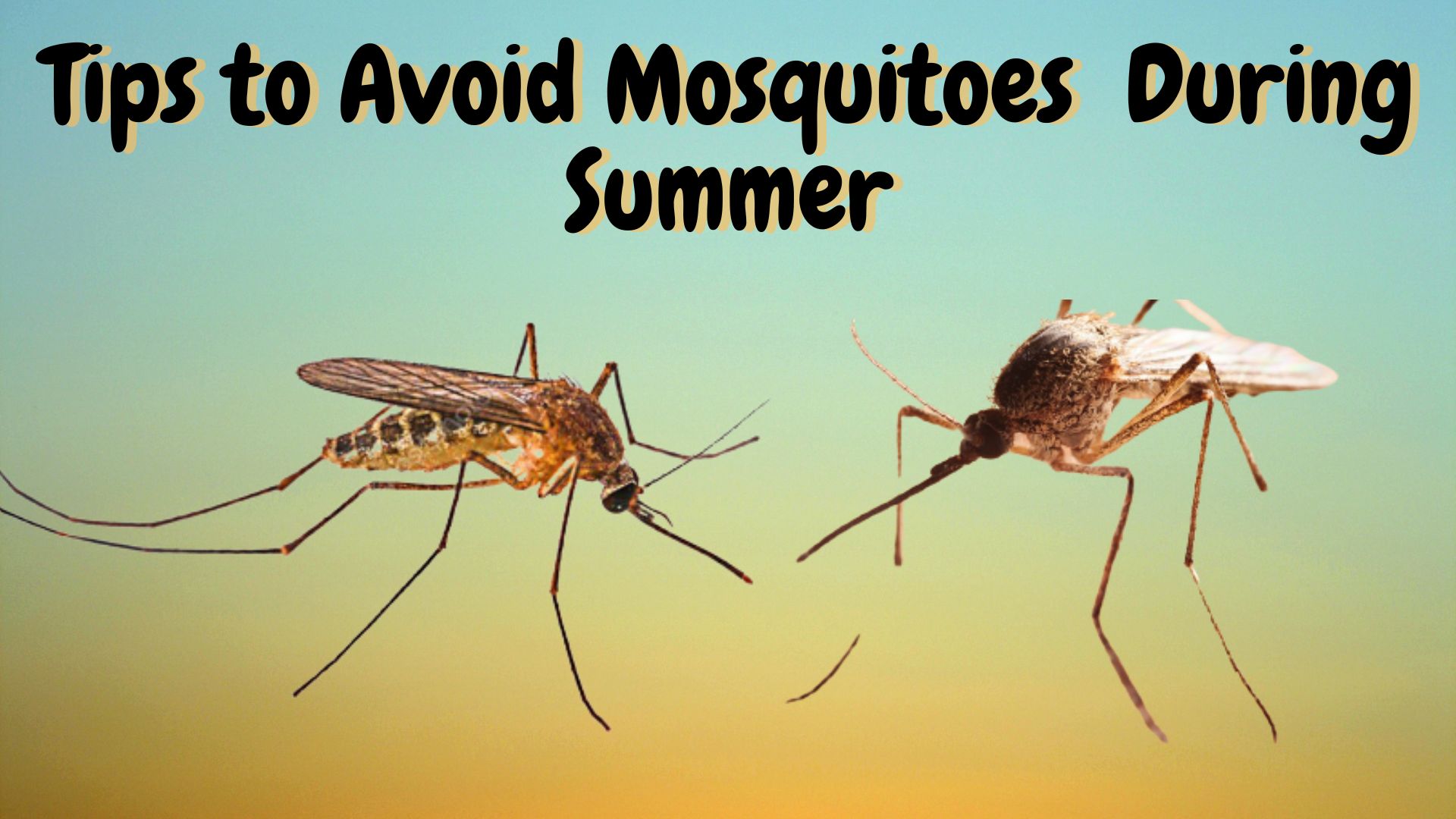Tips to Avoid Mosquitoes During Summer

Mosquitoes can be a nuisance during the summer months, and in some cases, can even carry diseases. During summer, mosquitoes are more active and abundant in many parts of the world. Mosquitoes are attracted to warm temperatures, standing water, and high humidity, all of which are common during the summer months.
Female mosquitoes need blood to produce eggs, and they are attracted to humans and animals by the carbon dioxide and other chemicals we exhale, as well as body heat and movement. Mosquitoes are most active during dawn and dusk, but they can also be active during the day, especially in shaded or damp areas.
It's important to take measures to prevent mosquito bites during the summer to avoid contracting mosquito-borne illnesses such as West Nile virus, Zika virus, and dengue fever. Some ways to prevent mosquito bites include wearing long-sleeved shirts and pants, using mosquito repellent containing DEET, picaridin, or oil of lemon eucalyptus, and removing standing water from around your home where mosquitoes can breed.
Here are some tips to help you avoid mosquitoes and reduce your risk of mosquito-borne illnesses:
1. Use mosquito repellent
Using mosquito repellent can be a very effective way to avoid mosquito bites. Mosquito repellents work by creating a barrier on your skin that makes it difficult for mosquitoes to detect you, and by masking the scents that attract mosquitoes. Mosquito repellents that contain DEET, picaridin, or oil of lemon eucalyptus are considered to be the most effective. When using mosquito repellent, it's important to follow the instructions on the label and apply it to exposed skin. It's also important to avoid applying mosquito repellent to open wounds, cuts, or irritated skin. If you're planning to be outside for an extended period of time, you may need to reapply mosquito repellent throughout the day.
Use mosquito repellent that contains DEET, picaridin, or oil of lemon eucalyptus on exposed skin to create a barrier that mosquitoes can't detect.
2. Wear long sleeves and pants
Wearing long-sleeved shirts and pants can be an effective way to avoid mosquito bites, as it creates a physical barrier between your skin and mosquitoes. When choosing clothing to wear outdoors, opt for loose-fitting, lightweight fabrics that provide good coverage, such as cotton or linen. Avoid tight-fitting clothing, as this can make it easier for mosquitoes to bite through the fabric. It's also a good idea to tuck your pants into your socks or wear shoes that cover your feet, as mosquitoes can bite through socks and footwear with mesh or holes. While long sleeves and pants may not be practical in very hot weather, they can be a good option during the cooler parts of the day or in areas with a high mosquito population.
Wearing lightweight, long-sleeved shirts and pants can prevent mosquitoes from having direct access to your skin.
3. Avoid peak mosquito hours
Avoiding peak mosquito hours is another effective way to avoid mosquito bites. Mosquitoes are most active during dawn and dusk, so if possible, try to avoid being outside during these times. If you need to be outside during peak mosquito hours, consider wearing long-sleeved shirts and pants, and using mosquito repellent on exposed skin. You can also try to stay in well-lit areas, as mosquitoes are attracted to dark areas. If you're planning outdoor activities like hiking or camping, try to schedule them during times of the day when mosquito activity is lower, such as midday or early afternoon. Additionally, be aware that mosquito activity can vary depending on the location, time of year, and weather conditions, so be sure to take these factors into account when planning your outdoor activities.
Mosquitoes are most active during dawn and dusk, so avoid being outside during these times.
4. Remove standing water
Removing standing water can be an effective way to reduce mosquito populations and avoid mosquito bites. Mosquitoes lay their eggs in standing water, so removing any standing water around your home can help reduce the number of mosquitoes in your area. Some common sources of standing water include bird baths, flower pots, gutters, and old tires. To eliminate standing water, empty out any containers that are holding water, and remove any items from your yard that can collect water. If you have a pool or other water feature in your yard, be sure to maintain it properly to prevent the buildup of standing water. If you live in an area with a high mosquito population, you can also consider using mosquito dunks, which are small tablets that release a bacteria that kills mosquito larvae in standing water.
Mosquitoes lay their eggs in standing water, so remove any standing water around your home, such as in bird baths, flower pots, and buckets.
5. Use screens and mosquito nets
Using screens and mosquito nets can be an effective way to keep mosquitoes out of your home or sleeping area. Make sure that all windows and doors have screens that fit tightly and don't have any holes or tears that mosquitoes can get through. If you're sleeping outdoors, consider using a mosquito net over your bed to create a physical barrier between you and mosquitoes. Mosquito nets can be especially useful in areas with a high mosquito population or where mosquito-borne diseases are a concern. When using a mosquito net, make sure that it's securely attached and doesn't have any holes or gaps where mosquitoes can enter. If you're camping or staying in an area without access to a mosquito net, you can also try using a mosquito coil or other insect-repelling devices to keep mosquitoes away from your sleeping area.
Use screens on windows and doors to keep mosquitoes out of your home, and use a mosquito net over your bed if you're sleeping outdoors.
6. Wear light-colored clothing
Wearing light-colored clothing can be an effective way to avoid mosquito bites, as mosquitoes are attracted to dark colors like black and navy blue. Lighter colors like white, beige, and light pastels are less attractive to mosquitoes, making it less likely that they will bite you. In addition to choosing light-colored clothing, opt for loose-fitting, lightweight fabrics that provide good coverage, such as cotton or linen. This will help to create a physical barrier between your skin and mosquitoes while also keeping you cool and comfortable in hot weather. It's also a good idea to avoid wearing strong perfumes or scented lotions, as these can attract mosquitoes and make it more likely that you will be bitten.
Mosquitoes are attracted to dark colors, so wear light-colored clothing to make yourself less attractive to them.
7. Keep your skin cool
Keeping your skin cool can be an effective way to avoid mosquito bites. Mosquitoes are attracted to warmth, so if you're overheated or sweating, you may be more likely to be bitten. To keep your skin cool, wear loose-fitting, lightweight clothing made from breathable fabrics like cotton or linen. You can also use a fan or air conditioning to cool down your living spaces and help keep mosquitoes at bay. Avoid spending too much time in direct sunlight, as this can also increase your body temperature and make you more attractive to mosquitoes. If you're going to be outside in hot weather, try to take breaks in shaded areas or go indoors to cool off periodically. Keeping your skin cool and comfortable will not only help you avoid mosquito bites, but it will also help you stay comfortable and reduce your risk of heat-related illness.
Mosquitoes are attracted to warm skin, so keep your skin cool by wearing loose-fitting clothing, staying in shaded areas, using fans or air conditioning, and staying well-hydrated.
8. Wear long sleeves and pants
Wearing long sleeves and pants can be an effective way to avoid mosquito bites, especially during peak mosquito hours. This can prevent mosquitoes from having direct access to your skin, reducing the risk of bites. It's important to choose clothing that is lightweight and breathable, so you don't overheat in hot weather. Additionally, you can consider wearing clothing that is treated with mosquito repellent or treating your clothing with a mosquito repellent spray for added protection.
Covering up as much skin as possible can help prevent mosquito bites.
9. Use mosquito repellent
Using mosquito repellent can be a very effective way to avoid mosquito bites. Mosquito repellents work by creating a barrier on your skin that makes it difficult for mosquitoes to detect you, and by masking the scents that attract mosquitoes. Mosquito repellents that contain DEET, picaridin, or oil of lemon eucalyptus are considered to be the most effective. When using mosquito repellent, it's important to follow the instructions on the label and apply it to exposed skin. It's also important to avoid applying mosquito repellent to open wounds, cuts, or irritated skin. If you're planning to be outside for an extended period of time, you may need to reapply mosquito repellent throughout the day.
Apply a mosquito repellent that contains DEET, picaridin, or oil of lemon eucalyptus to exposed skin.
10. Avoid being outside during peak mosquito hours
Mosquitoes are most active during dawn and dusk, so avoiding being outside during these times can be an effective way to avoid mosquito bites. If possible, plan outdoor activities during the daytime, when mosquito activity is generally lower. If you do need to be outside during peak mosquito hours, consider wearing long sleeves and pants, using mosquito repellent, and staying in areas that are well-lit, as mosquitoes are attracted to dark areas. You can also try to avoid areas with standing water, as these are common breeding grounds for mosquitoes.
Mosquitoes are most active during dawn and dusk, so try to avoid being outdoors during these times.
11. Remove standing water
Removing standing water around your home can be an effective way to reduce the mosquito population. Mosquitoes lay their eggs in standing water, so getting rid of sources of standing water can prevent them from reproducing. Some common sources of standing water include bird baths, flower pots, buckets, and other items that collect rainwater. Make sure to empty and clean these items regularly, and consider using mosquito dunks or other larvicides to kill any mosquito larvae that may be present. Additionally, make sure that your gutters are clean and draining properly, and that any low-lying areas in your yard are filled in to prevent standing water from accumulating.
Mosquitoes lay their eggs in standing water, so getting rid of any sources of standing water around your home can help reduce the mosquito population.
12. Use screens and mosquito nets
Using screens on windows and doors can help keep mosquitoes out of your home. Make sure that all of your screens are in good condition and don't have any holes or gaps where mosquitoes can enter. If you don't have screens on your windows or doors, consider installing them to help keep mosquitoes out. If you're planning to sleep outdoors, using a mosquito net over your bed can be an effective way to avoid mosquito bites. Make sure that the net is securely attached and covers the entire sleeping area. Additionally, make sure that the netting material is fine enough to prevent mosquitoes from passing through.
Use screens on windows and doors to keep mosquitoes out of your home, and use mosquito nets over beds when sleeping outdoors.
13. Wear light-colored clothing
Wearing light-colored clothing can be an effective way to reduce the likelihood of being bitten by mosquitoes. Mosquitoes are attracted to dark colors, so wearing light-colored clothing can make you less attractive to them. Additionally, light-colored clothing can help keep you cooler in hot weather, which can also reduce your risk of being bitten by mosquitoes, as they are attracted to warm skin. When choosing clothing to wear outdoors, opt for loose-fitting, lightweight fabrics that provide good coverage, such as cotton or linen. Avoid tight-fitting clothing, as this can make it easier for mosquitoes to bite through the fabric.
Mosquitoes are attracted to dark colors, so wearing light-colored clothing can help reduce the likelihood of being bitten.
14. Keep your skin cool
Keeping your skin cool can be an effective way to reduce the likelihood of being bitten by mosquitoes. Mosquitoes are attracted to warm skin, so if you can keep your skin cool, you may be less attractive to them. Some ways to keep your skin cool include wearing loose-fitting clothing made from lightweight, breathable fabrics, and staying in shaded areas. You can also use a fan or air conditioning to keep your living spaces cool, which can help repel mosquitoes. Additionally, staying well-hydrated can help keep your body temperature down, making you less attractive to mosquitoes.
Mosquitoes are attracted to warm skin, so keeping your skin cool can help reduce the likelihood of being bitten.
Conclusion
In conclusion, there are several effective ways to avoid mosquitoes during the summer months. These include using mosquito repellent, wearing long sleeves and pants, avoiding peak mosquito hours, removing standing water, using screens and mosquito nets, wearing light-colored clothing, and keeping your skin cool. By following these tips, you can reduce your risk of mosquito bites and the potential spread of mosquito-borne illnesses. It's also important to stay informed about mosquito activity in your area and take additional precautions as needed to protect yourself and your family.




 Login with Facebook
Login with Facebook
 Login with Google
Login with Google